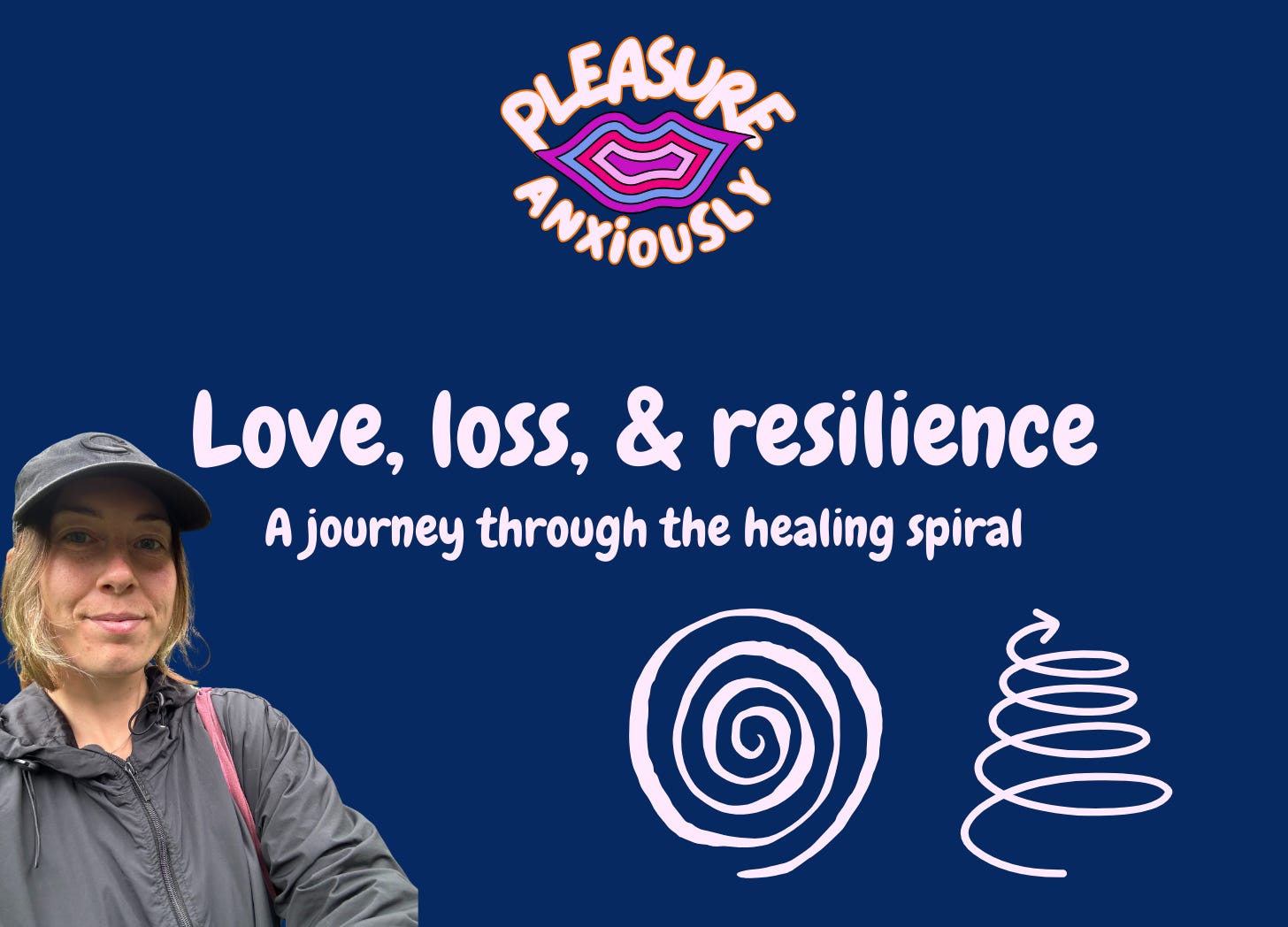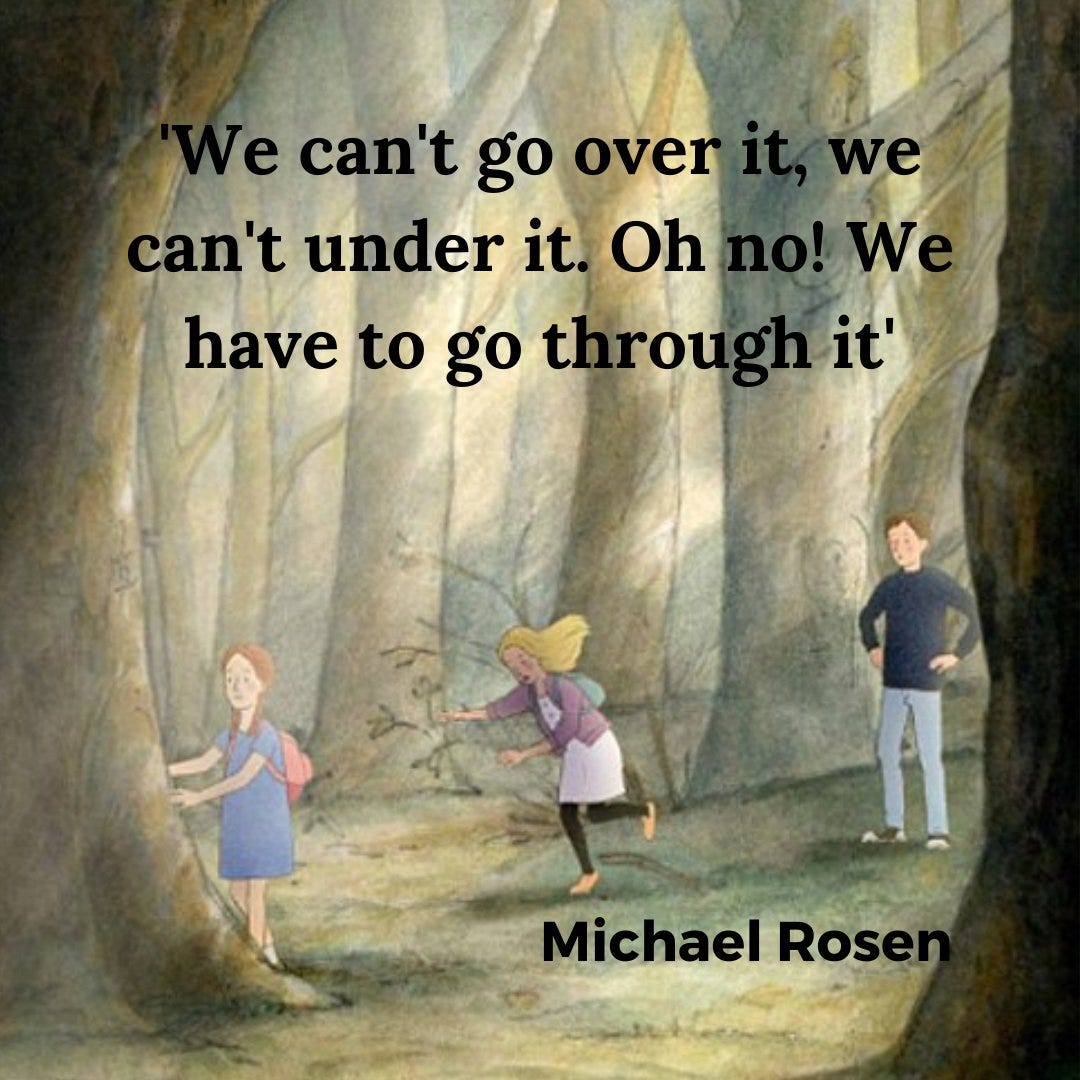Love, loss, and resilience: A journey through the healing spiral
The personal is political, the political is personal. I share some concepts that have helped me go through heartbreak to healing. (Plus: 'Grief to Gratitude' guided audio practice)
“In the wake of a shattered heart, a journey of healing begins. Time is not the only remedy; self-love is the key. Through tears and tender moments, resilience grows, scars become symbols of strength. Healing is not about forgetting, but finding peace within.” — Helen Hagemeier
Better to have loved and lost, than to have never loved at all. So they say.
As personal and political grief interweave, healing can feel like an ongoing journey, echoing through a process of love, loss, and growing resilience. In the current state of things, I feel it hard to separate my emotions from the very real fact that the world is going through so much turmoil.
Considering how politics has a real impact on our bodies and our relationships, my heavy emotions remind me of the feminist phrase popularised by activist Carol Hanisch in her essay of the same name from 1969, ”the personal is political”.
As I find healing and connection in writing and sharing, one of the reasons I started this blog, I wish to share some healing thoughts that have gotten me through this trying year, in the hope that they will prove valuable for anyone who might be feeling emotional pain in their personal lives, perhaps due to political circumstances.
Even though this content is not behind a paywall, I want to share that it takes time and energy to create and upload the content that I create, do please consider becoming a paid subscriber of ‘Pleasure Anxiously’ for as little as £3.99 a month to support my work.
For real though, it’s been a minute since I last posted on here, and I have had a wave of new subscribers, so Hello anxious pleasure seekers, and welcome all to this space!
My latest writing pause is mainly because I’ve been away travelling in Italy and Berlin, living my best Euro-vacay life. But, in reality, it’s all been against a backdrop of heartbreak.
Some personal reflections
I do believe there is a difference between privacy and secrecy, and there are some things about my personal life, namely intimate relationships, I choose not share for wanting to maintain a boundary of privacy (this is for me). Yet, I don’t want to feel like I have a “secret” (this is shameful) that I’m going through this difficult transitional phase. There’s no shame in the endings of a relationship.
And yet, toward the end of this relationship, I recall feeling such deep shame around feeling like a “failure”.
As someone who has dedicated their career to being a so-called “expert” in the field of sex, love, and relationships, it was hard to grapple with my perfectionist ego that told me “you are a fraud if this relationship fails.”
In reality… I need to give myself some credit. It’s a strange paradox teaching sensual intimacy while going through your own heartache. What I came to realise is that we’re all on this messy journey together, and the most important thing is not how perfectly we handle it, but how we show up for ourselves and each other in the midsts of it.
What I can celebrate, through all of the hardships, is how powerful it was to have my own back. To hold myself with compassion, especially through the darker days.
From grief to gratitude
I’d like to share some of the known phases and stages of grief that you may or may not find yourself in, once, twice, or over and over again. The main takeaway is a reminder that progress isn’t linear.
So whether you are grieving for the planet under the political state of things, a relationship or loved one, or a dream or hope you had for your future, we all find ourselves embarking on journeys that involve going through the darkness. In the hope that we may come out the other side and into the light.
Healing reminds us: the light and dark will always return in cycles.
In navigating my own heartbreak, I’ve cycled through each of these stages—sometimes even in the space of one day. The 5 stages of grief developed by Elizabeth Kübler-Ross in 1969 are:
Denial - where we may cling to a false and preferable reality
Anger - feelings of frustration and need to blame
Bargaining - a state of hope that we can compromise out of the pain
Depression - total sense of despair and sullenness
Acceptance - a stable condition of embracing the inevitable
I studied Psychology at A-Level and I remember learning about a variety of phases of relationship breakdown. Most of which, I will add, were based on a heteronormative monogamous model of relationships. But here was Ducks phases:
Intra-psychic - dissatisfaction in the relationship leads to weighing up the pros and cons
Dyadic - discussion of the dissatisfaction with the partner
Social - seeking external support from friends and family
Grave dressing - a story is constructed to understand and move forward
Resurrection - moving beyond pain and into personal growth
While the traditional stages of grief outline the emotional journey, somatic work reminds us that healing is deeply embodied. One framework that has helped me through this process is Kai Cheng Thom’s concept of the ‘healing spiral.’
Initial injury & spiritual crisis
Stabilisation & grounding
Exploration & self-discovery
Descent into the underworld
Collapse & transformation
Embracing the shadow
Facing fears/doing the impossible
Reconnecting to life
Sharing the medicine
The next adventure
Where are you on this spiral? Leave a comment, I’d love to hear if this is resonating!
I find these emotional stages empowering as we become aware of our healing looping back and forth, drifting from pain into pleasure, and back to pain again. Teaching us that our trauma, loss, heartbreak, or whatever has caused you pain, can eventually be transformed.
This can offer space for possibility and growth, if we let it.
MEDITATION EXERCISE
I also want to share a beautiful exercise ‘Grief to Gratitude’. Practising this has been an anchor for me on difficult days, letting me sit with the grief rather than trying to escape it (though escaping it can be very needed at times).
Start by taking a few deep breaths and ground in the present moment
If at any point it feels too overwhelming, take a break and do something nice for yourself, like make a cup of tea or go for a walk in nature
If it feels safe enough to, recall the person, memory, dream, or hope that you feel you have lost and need to grieve
Notice what physical sensations are coming up in your body without judgement
Now place a hand over your chest and one on your belly and just allow whatever emotion that is coming up to come up
Let yourself breathe through, and even guide the emotion up and out by brushing the energy upwards over your body and out of your throat
Allow the emotion to process through deeper breaths, letting go of whatever needs to be released
Recalling the person, memory, dream in your mind’s eye, and take a moment to notice how far away it feels from you? And how bright or dim is the vision?
Just imagine you are bringing the person, memory, dream, or hope closer to you, dialling up the brightness, and calling it into your heart
And just rest, and let it all be.
A collective chance for resurrection
What I believe we all need, now more than ever, is a strong sense of community. In this journey of healing, finding where that we belong within ourselves can help us find belonging with each other. I feel that our stories of love, loss, and resilience, remind us that we’re not alone.
The process of rebuilding takes brave steps, which may include following our passions, setting healthy boundaries, and practising radical self-acceptance—especially when it comes to the darker, more difficult parts of our journey.
Ultimately, healing is both personal and collective. We heal not just for ourselves, but for each other, knowing that this commitment to hope, love, and community, is a political act of resistance.
Thank you for reading ‘Pleasure Anxiously’. As a brief reminder, here are some of the offerings & treats I have for you at the moment:








A nice read. 🖤 Best wishes on your healing journey.
I inevitably had my first real heartbreak in 2017¿ (very devastating, as you can imagine) and a couple years later I went into my community college’s library - just to look around. I wasn’t ready to go home just yet tbh, and I had been wanting to check out the library. Anyway, I went to the psychology section and happened upon a book called Ambiguous Loss (Pauline Boss). I honestly don’t know why it stood out to me, but my flabbers were gasted. Finally having a name for that pain; I had never heard it termed before. Reading about the loss and grief was so validating, and I felt so..understood. Less abnormal for the drastic reaction that my heartbreak caused. Because it’s not something we just talk about..the ugly things. I never forgot that book and ended up getting it later. It’s a good read if you haven’t heard of it. 🙃 Sorry for writing a book here! 😅
Thank you for this 🙏